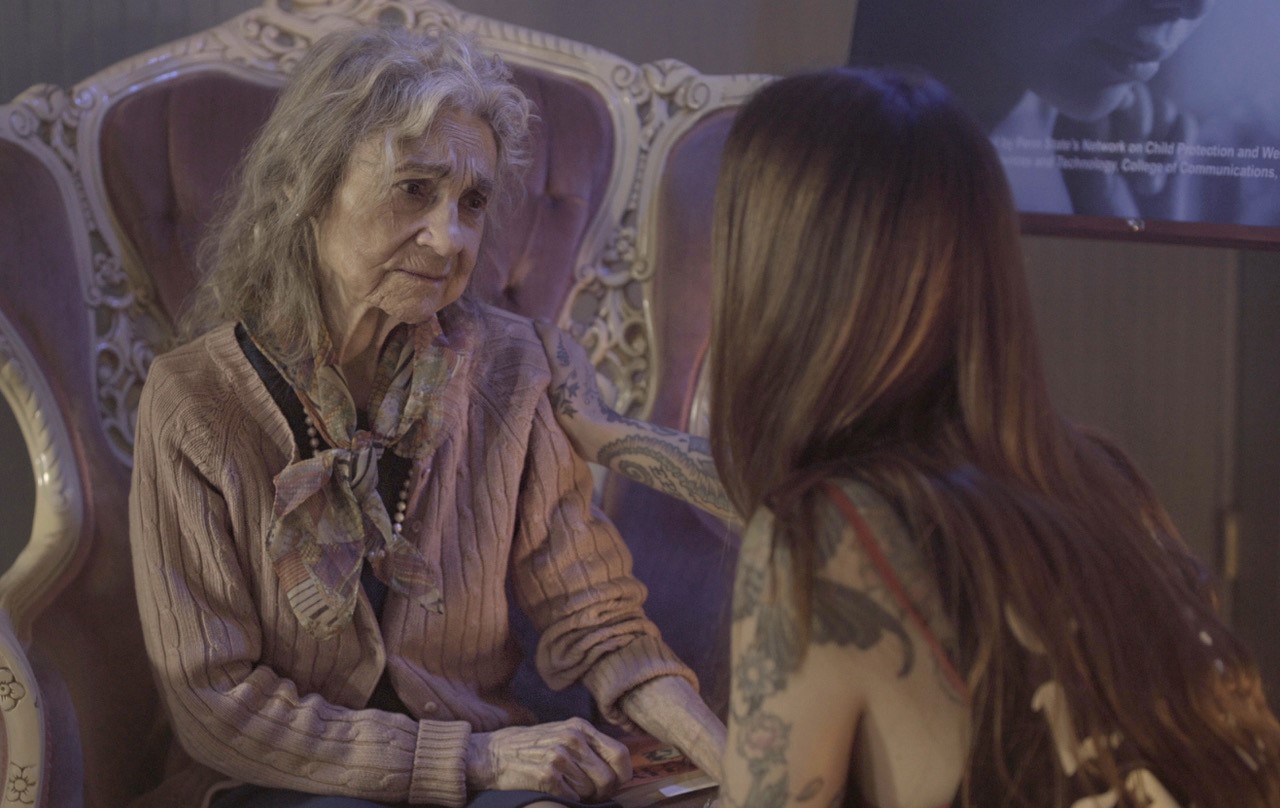
WRITE ME
Write Me follows an older woman who joins other survivors in reclaiming the histories tattooed on their bodies. The film is adapted from and driven by an award-winning poem, “After Auschwitz,” written by Deborah Kahan Kolb.
Director’s Statement by Pearl Gluck
All my life, at least the short part when I got to spend time with my grandmother, Frida, sitting across her kitchen table, sharing family celebrations with her, holding her hand through her last moments in a hospital bed, I couldn’t see past the number tattooed on her forearm. The number is A-9106. She got that number in Auschwitz against her will in 1944, and wore it, I thought, as a badge of courage, of decided survival. Despite what she suffered, she held strong to her faith, her femininity, and her vitality. Two generations after she came to the United States from Hungary through Ellis Island, I was born, a first generation American, into the Hasidic tradition and speaking Yiddish as my first language. In her honor, I believe, much of my work as a filmmaker has been centered in unflinching women’s voices, my own approach to the Hasidic faith of my youth, and activism. Both she and the number tattooed on her body have left a mark.
Many years after my grandmother passed away, I directed a feature film, The Turn Out, which was a story about a trucker who helps a young woman being trafficked at his local truckstop. In the process of researching the film, I met survivors of trafficking in Ohio, specifically Jennifer Kempton who founded Survivor’s Ink, an organization that replaces brandings tattooed on women by their traffickers. I learned how some women, despite escaping their oppressors, feel the bondage of their servitude until they can cover up or remove their tattoos and brandings. In the process of crafting a narrative script based on my research, some elements of the complicated and darkly intricate world of trafficking were left for another project. This aspect was one of them.
When Deborah Kahan Kolb shared her poetry with me and discussed her uncle Bernie’s desire to remove his Auschwitz tattoo, I was inspired to combine the narratives of these women and allow them to inspire each other intergenerationally, allow them to empower each other interculturally, find common ground in women’s intention to survive. My experience of working with many survivors of the Holocaust, specifically women, they seem to present sanitized stories of their experience, with no mention of rapes and sex trafficking, though we are aware that large number of women and some boys and men were victims of trafficking during the Holocaust as well. For me the interlayering of these stories based on Ms. Kolb’s poem and her appreciated for the written word, felt apt. From these connections, the script for “Write Me” was born.
It was at the moment that the script was completed, and as I was typing the last scene, I found myself writing my grandmother’s number, A-9106, and we kept it there.
My hope is that the language of the poetry and the images of the film interconnect in “Write Me” and encourage dialogue
Poet’s Statement by Deborah Kahan Kolb
I grew up listening to stories of the concentration camps from my Holocaust survivor grandparents. These horror stories were practically woven into the fabric of our everyday lives. As children, my siblings and I flipped through pages of old family photo albums and understood as a matter of fact that more than half of the people we saw in the pictures were no longer alive, that they were all murdered because they were Jews.
My grandparents, along with most of their peers – their fellow sufferers, their fellow witnesses – are now gone. In my view, telling the stories of the trauma of the Holocaust is ever more urgent, as the number of survivors dwindles rapidly and displays of anti-Semitism escalate alarmingly. Most of those who endured the atrocities of man’s inhumanity to man are no longer here to bear witness. It’s up to us – the poets, the writers, the storytellers – to take up the banner of witness-bearing, to tell and retell these stories to future generations, so that the world is not allowed to forget.
I’ve always been looking for ways to make poetry more generally accessible, and I thought film would be a compelling vehicle to bring poetry and its particular message to a broader audience.
A few years back my husband’s octogenarian uncle, the last Holocaust survivor of our families, did something extraordinary: he removed the Auschwitz tattoo from his arm. He’d had enough, he said, of the Nazis owning him. I was inspired to write the poem “Re(vision)” which is essentially the story of an older man, branded in violence, who decides in the twilight of his life to reclaim his body and redefine his life.
I reached out to Pearl Gluck, herself a grandchild of Holocaust survivors. Pearl and I have a shared childhood experience in the Hasidic enclave so deeply informed by a diasporic past. Her work also engages themes of Judaism, women, and faith. Pearl wrote and directed the script for Write Me adapted from my poem “After Auschwitz,” which invokes the memory of all the minority groups who were marked for death by Hitler: the Jews, the communists and the cripples, the homosexuals and the Romani gypsies. The poem is a call to poets to “write me” – to give life, in poetry, to those who were killed so that they are not lost to history. She added the element of brandings in the world of domestic sex trafficking and how survivors struggle to cover up their own tattoos much like my Uncle Bernie did with his arm.
The resulting short film fuses the experiences of myriad sufferers and survivors, all with one goal: ownership of one’s body and identity.
